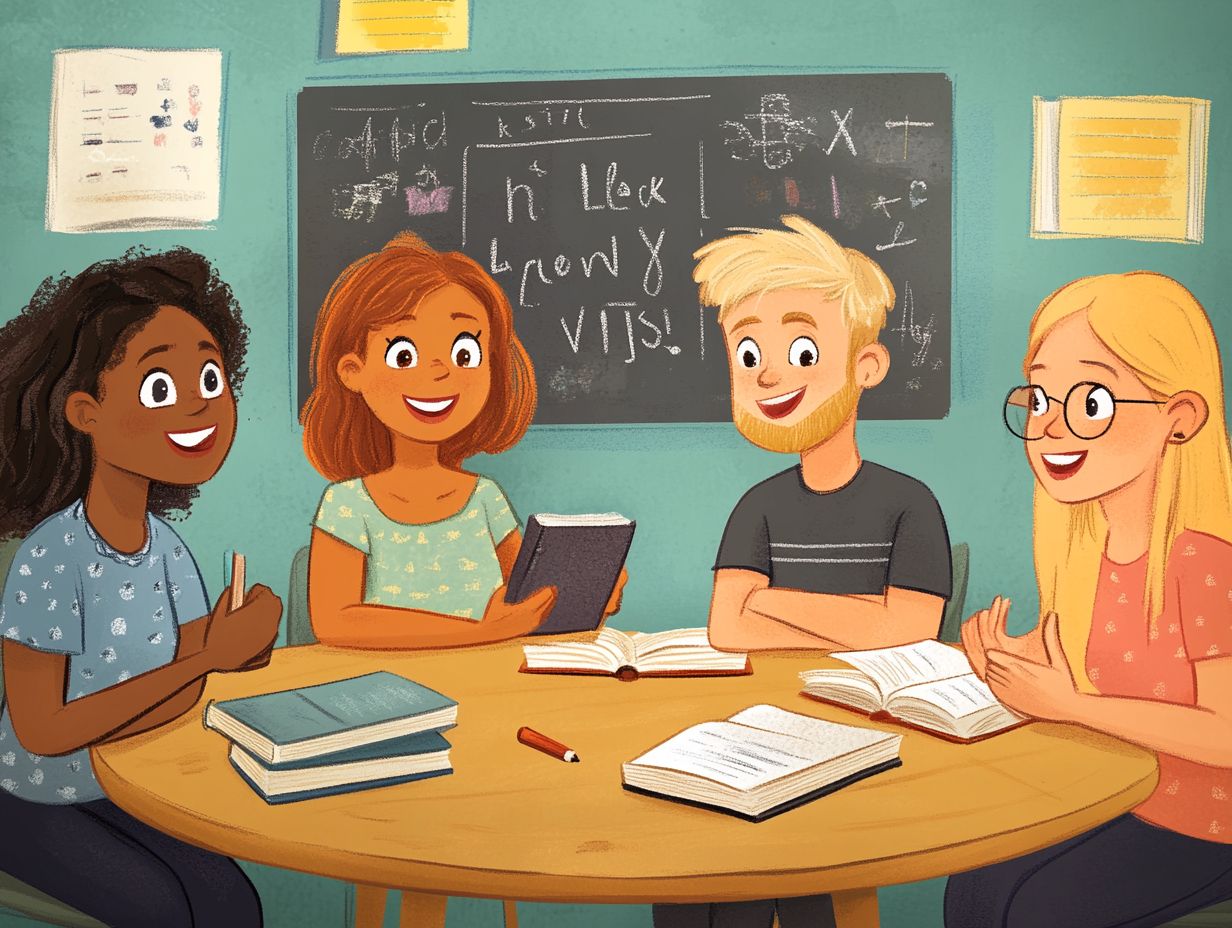Common Language Learning Myths Debunked
Language learning often comes with a cloud of misconceptions that can dampen even the most enthusiastic learners. Get ready to uncover six common myths about language learning that might be holding you back!
From ideas about instant fluency to the supposed necessity of formal education, these myths can set up unwarranted obstacles in your path. This article delves into six prevalent myths about language learning, debunking each one with valuable insights and facts.
Whether you re just starting out or aiming to refine your skills, grasping these myths will empower you on your journey toward mastering a new language.
Let s dive in!
Contents
- Key Takeaways:
- Myth #1: You Need to Be Fluent to Be Considered Successful
- Myth #2: Children Learn Languages Better Than Adults
- Myth #3: You Need to Study Abroad to Become Fluent
- Myth #4: Some Languages Are Easier to Learn Than Others
- Myth #5: You Have to Have a ‘Language Learning Gene’ to Be Successful
- Myth #6: You Can’t Learn a Language Without a Teacher
- Frequently Asked Questions
- What are some common language learning myths?
- Is it true that you have to be naturally gifted to learn a new language?
- Do children really learn languages better than adults?
- Is immersion necessary to become fluent in a language?
- Can you become fluent in a language just by studying grammar and vocabulary?
- Do online language courses and apps really work?
Key Takeaways:

- Fluency does not equal success in language learning.
- Age does not dictate language learning ability; adults are just as capable as children.
- Studying abroad is not necessary for fluency; consistent practice and immersion can be just as effective.
What are Common Myths About Language Learning?
Language learning is often clouded by a host of myths that can discourage even the most dedicated individuals from achieving their fluency goals. These misconceptions like the idea that you must be fluent to be successful or that children naturally learn languages better than adults can create significant barriers for you as an adult learner eager to enhance your communication skills.
Grasping these language myths is vital for managing your learning journey better. It allows you to leverage a wealth of resources and tools, from podcasts to apps, for consistent practice and improvement of your pronunciation and vocabulary.
One widespread myth suggests that you need to achieve complete fluency right off the bat, which can be disheartening when you feel you re not living up to unrealistic standards. In reality, it s the small, incremental improvements and ongoing conversations that truly propel your growth.
Another common misconception is that adults can t pick up languages as easily as children, ignoring the fact that you bring invaluable experiences and insights that enrich your learning journey.
Many believe that formal education is the sole route to mastering a language, overlooking the great benefits of hands-on experiences and diverse learning tools. By debunking these myths, you can embrace your unique path, enabling yourself to communicate effectively and understand others more deeply.
Myth #1: You Need to Be Fluent to Be Considered Successful
Believing that you need to reach a specific fluency level to be deemed successful in language learning is not only misguided but can also undermine your motivation.
True success in language learning should be defined by your ability to communicate effectively, no matter where you stand on the fluency spectrum. Focus instead on setting short-term goals that create more opportunities for practice and speaking. This allows you to grow and develop in a way that feels rewarding and achievable.
Debunking the Myth
Debunking the myth that fluency is a prerequisite for success opens up a more nuanced understanding of language acquisition (the process of learning a new language), allowing you to appreciate the gradual improvement in your communication skills over time.
Shifting your focus towards effective communication helps you cultivate confidence and engage in meaningful conversations with greater ease. Employing strategies like attending language exchange meetups or using language learning apps enables you to express your ideas without the weight of striving for perfect grammar.
Participating in role-playing exercises or seeking feedback from native speakers encourages authentic dialogue, creating a better learning experience. As you prioritize interactive engagement over simple vocabulary repetition, you’ll not only enhance your ability to convey thoughts but also deepen your cultural understanding, leading to more rewarding social interactions.
Myth #2: Children Learn Languages Better Than Adults
The idea that children possess an innate advantage in language learning tends to oversimplify the intricate nature of language acquisition and underappreciates the distinctive strengths that adults offer, such as motivation and access to a wealth of language resources.
While it s evident that children s brains may exhibit greater adaptability, you, as an adult learner, can draw upon your life experiences and cognitive skills to enhance your language learning journey effectively.
Challenge your assumptions and unlock your true potential in language learning!
Debunking the Myth

Debunking the myth that children learn languages better than adults highlights the crucial role of motivation and the effective use of language resources that you can tap into as an adult learner.
While it’s true that young minds are often more malleable, you possess unique advantages that can significantly enhance your learning a new language. Your drive from personal goals typically arises from personal, professional, or academic aspirations. This compels you to dedicate time and resources to your studies.
Being resourceful allows you to leverage a variety of tools from online platforms to language exchange opportunities that younger students may not always have at their fingertips. Your prior knowledge and life experiences enrich your understanding and retention of new language concepts and nuances.
Embrace your strengths. You have the power to challenge traditional narratives and prove that age is not a barrier to mastering a new language.
Myth #3: You Need to Study Abroad to Become Fluent
The notion that immersing yourself in a foreign country is the sole route to achieving fluency in a new language overlooks the wealth of effective strategies you can implement right from the comfort of your own home.
Language exchange programs and engaging with native speakers are just a couple of options that can be incredibly effective. Studying abroad offers incredible opportunities! However, it is by no means a prerequisite for mastering a new language.
Debunking the Myth
Debunking the myth that studying abroad is essential for achieving fluency highlights the importance of practicing speaking and the wealth of resources at your fingertips to connect with native speakers, all without leaving your country.
In reality, you can craft rich and immersive experiences right from home by harnessing technology and tapping into local community resources. By engaging in online language exchanges, you can hold conversations with native speakers, significantly enhancing your speaking skills.
Utilizing language apps not only aids in building your vocabulary but also offers the chance to practice pronunciation in real-time.
Watching movies, listening to music, and reading books in your target language deepens your understanding. These activities effortlessly transform everyday moments into valuable learning experiences.
Myth #4: Some Languages Are Easier to Learn Than Others
The claim that some languages are inherently easier to learn than others is a sweeping generalization that overlooks the nuances of individual motivations, prior language experiences, and the intricate grammatical complexities involved in language acquisition.
Every language offers its own distinct challenges and rewards, shaping your journey toward achieving various levels of fluency.
Debunking the Myth
Debunking the myth that some languages are easier to learn than others enables you to appreciate the unique challenges each language presents. It underscores the vital roles of motivation and adaptability in your language acquisition journey.
By adopting a positive mindset, you can focus on the differences in grammar rules and structures. Allow these nuances to enrich your understanding instead of overwhelming you. A motivated learning environment boosts retention and transforms the experience into something enjoyable.
For instance, engaging with native speakers and immersing yourself in cultural contexts can make those complexities feel far less intimidating. This interactive approach fosters a deeper connection with the language, turning potential frustration into genuine excitement.
Ultimately, recognizing that every language has its intricacies enables you to navigate your linguistic journey with enthusiasm and resilience.
Myth #5: You Have to Have a ‘Language Learning Gene’ to Be Successful

The notion that you need a ‘language learning gene’ to succeed in mastering a new language is a misleading belief that undermines your potential. It overlooks the crucial role of consistent practice and dedication, which far outweigh any innate ability.
Language acquisition is not merely a gift; it’s a skill that can be developed through your motivation and the application of effective strategies.
Debunking the Myth
Debunking the myth that you need a ‘language learning gene’ underscores the importance of practice and motivation in mastering a new language. Anyone can enhance their communication skills through dedicated effort.
This revelation opens up a world of possibilities for learners who may have felt discouraged in the past. By setting realistic goals and incorporating daily practices like speaking, listening, or writing, you can gradually build your proficiency.
Engaging with native speakers through conversation exchanges or online forums can significantly boost your confidence. Mixing in language apps and flashcards into your daily routine enhances your learning and adds an element of fun to the process.
Ultimately, consistent effort, paired with your genuine desire to improve, serves as the true foundation for mastering a language. This allows you to flourish on your language learning journey.
Myth #6: You Can’t Learn a Language Without a Teacher
The belief that formal instruction is essential for language learning overlooks the myriad resources available to you as a self-directed learner. While educators can offer valuable insights, harnessing language tools, apps, and community resources can be just as powerful in your journey toward proficiency.
Embracing this varied approach allows you to tailor your learning experience to suit your needs and preferences.
Debunking the Myth
Debunking the myth that you need a teacher to learn a language reveals the wealth of resources and tools available for self-learners. It highlights the incredible impact of practice and community engagement.
You can tap into online platforms, language exchange apps, and social media groups to connect with fellow learners and native speakers, crafting immersive environments that mimic traditional classroom settings.
Many self-taught learners share their journeys on forums and blogs, detailing how they ve harnessed applications like Duolingo and Babbel, alongside YouTube tutorials and podcasts, to sharpen their skills.
The collective experiences of these learners underline the accessibility of learning tools and the motivation and support found through community interactions. With dedication and creativity, you can achieve amazing language skills faster than you think!
Essential Tips for Successful Language Learning
Successful language learning hinges on your commitment to consistent practice and motivation, paired with a strategic approach that leverages a variety of resources and tools to enhance your communication skills effectively.
To debunk common myths surrounding language acquisition, it’s crucial to understand that perfection is not a requirement for progress. Immerse yourself in the language through diverse media think films, music, and books. This makes the learning process enjoyable and provides valuable context. Setting small, achievable goals helps maintain focus and enthusiasm.
Engaging with native speakers, whether through online platforms or local meetups, elevates your real-world communication skills and builds your confidence.
By embracing these strategies, you can cultivate a language learning journey that feels rewarding rather than overwhelming.
Frequently Asked Questions

Start now and unlock a new world of communication!
What are some common language learning myths?
Many believe that you must be naturally gifted to learn a new language. Others think children learn languages better than adults, or that immersion is required for fluency.
Is it true that you have to be naturally gifted to learn a new language?
No, this is a common myth. Anyone can learn a new language with dedication and practice.
Do children really learn languages better than adults?
This is another misconception. Children may pick up languages more easily, but adults can learn effectively with the right methods.
Is immersion necessary to become fluent in a language?
Not necessarily. While immersion helps, you can achieve fluency through consistent practice and the right resources.
Can you become fluent in a language just by studying grammar and vocabulary?
No, that s a misconception. You also need to practice speaking, listening, and reading to truly become fluent.
Do online language courses and apps really work?
Yes, they can be very effective! Just make sure to choose a reputable program and combine it with real-life practice.




